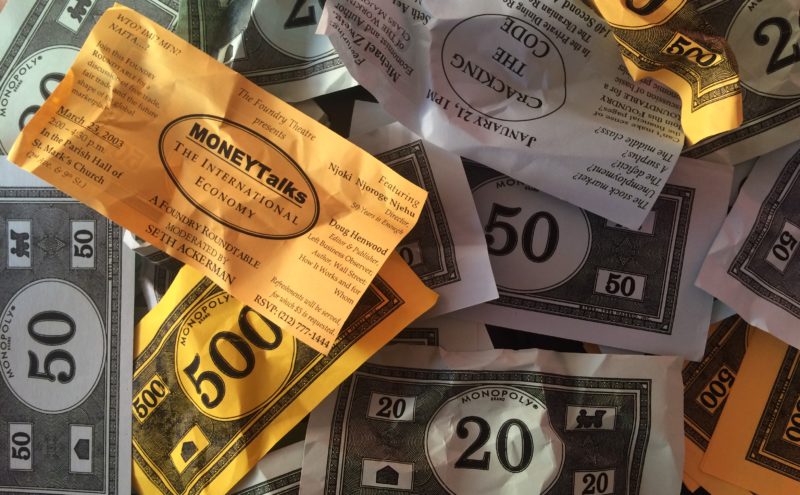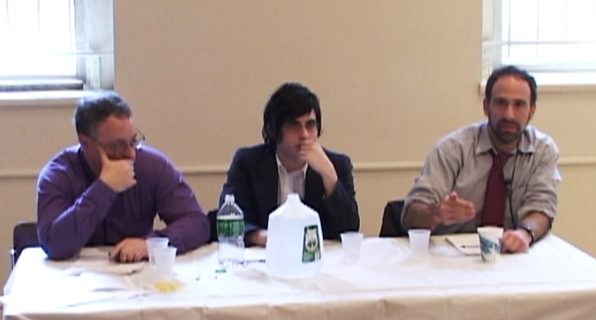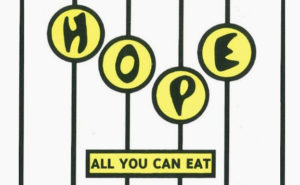
NYC’s budget crisis? The future of rent control? Bush’s economic plan? Social security? The stock market? The future of welfare? Unemployment? US Trade Deficit? Free trade? The World Bank, NAFTA, The Fed, IMF, WTO… ?? Where are we and how did we get here?
Back by popular demand, this second edition of Money Talks brings back Money Talks 2001 guest journalist, Seth Ackerman, this time to moderate three dialogues with renowned journalists and economists with whom we will continue The Foundry’s inquiry into how economic policies and practices impact our lives and culture — especially given the current recession, the impending war and diminishing civil liberties, and United States’ place in the global economy.
Featuring
Dean BakerWayne Barrett
Bonnie Brower
Doug Henwood
Njoki Njoroge Njehu
James Parrott
Analia Penchaszadeh
Moderated/Curated by
Seth AckermanCreative Producer:
Melanie JosephFebruary 23, March 9 & March 23, 2003 : St. Mark’s Church, Parish Hall
Dialogue One
A Deficit of WHAT?
With this enormous budget crisis we’re facing, both at the state and city levels, much of the media is pointing to September 11th — i.e. the economy tanked as a result of that catastrophic attack and now we have this budget crisis. How specifically were these related? What are other origins of this crisis?
Panelists: Wayne Barrett, Bonnie Brower & James Parrott
Moderated by Seth Ackerman
Governor Pataki, who likes to call himself the national champion of cutting taxes, has made state tax cuts each year that amount to about $13 or $14 billion. So for the state, the taxes cut in the last few years — personal income taxes with most of the benefits going to high income individuals, corporate taxes and a lot of other taxes — more than account for the size of the budget gap. And we have a 9.3 billion dollar hole that the governor now [after the election] finally acknowledges.”
– James Parrott
“I think politics is a lot more geopolitical than it is ideological. I’ve sat in budget sessions in Albany where state senators from upstate – all they do when the budget is presented is ask how many cells they’re going to get. ‘How many cells is my district going to get?’ Prison cells… and it’s not just building a new prison, it’s ‘are you going to add beds to my district?’ And we know, Governor Pataki has basically abolished parole, now is that an ideological position or is that a geopolitical position? What’s driving it? It’s driving the industry of upstate – there are whole towns that survive on it – and all these Republican state senators are fighting for cells.
And if you look at the national picture, what’s happened across the country, the defense industry… so when Republicans cut all forms of social welfare expenditures, what states get hurt the most? States like ours that vote Democratic. When you increase defense expenditures, what states benefit the most? Look at the chart on Election Day and you could figure out. Is it ideology that’s driving that or is it ‘bring the bacon’ – figuring out how to design the bacon so it gets to my core constituents.”
Wayne Barrett
James Parrott [bio from 2003], Deputy Director and Chief Economist for the Fiscal Policy Institute, one of the leading budget analysis think tanks in the state and the city. Parrott also served as Chief Economist/Director of the Bureau of Fiscal and Economic Analysis for the Office of the State Deputy Comptroller for New York City (OSDC) and was the Chief Economist for the City of New York’s economic policy office under Mayor David N. Dinkins.
Wayne Barrett [bio from 2003; Wayne Barrett passed away in January 2017] An award-winning investigative reporter at the Village Voice, specializing in state and city politics for 23 years, and senior editor for the last decade. His latest book, RUDY: An Investigative Biography of Rudolph Giuliani, completes a trilogy that covers the politics of New York in the final quarter of the 20th century. More recently, Barrett has written about Giuliani’s racial politics as mayor alongside other ethics issues regarding City Hall.
Bonnie Brower, [bio from 2003] a lifelong New Yorker, is the Executive Director of City Project,which builds advocacy, policy and organizing work towards greater economic, racial and budget justice. Brower was a founder of the Association for Neighborhood and Housing Development (ANHD), where she served as its Executive Director for 10 years, organizing for the preservation and creation of permanent affordable housing for low and moderate income New Yorkers.
Money Talks Series Moderator/Co-Curator

Dialogue Two
The National Economic Bubble
Now that we’re in this downturn or recession — if it is that — how did we get here, and how did it grow out of the bubble, the boom, that we had in the nineties? Where did that boom come from? And how did it lead to where we are now?
Panelists: Dean Baker & Doug Henwood
Moderated by Seth Ackerman
During the bubble, Doug was saying … we both had the experience of going, this doesn’t make sense. I was on panels with many prominent economists, and I’d just go, if this makes sense, if price-to-earnings ratios of 30-to-1 – the historic average was less than 15-to-1 – if this makes sense, write it down for me. What’s the path of stock price growth, what is the path of dividend yields that makes sense of this? None of them would do it. I’d challenge them; I’d do my best to humiliate them. I’d go, come on, we write things down – that’s what economists do. None of them ever took me up on it. I’m sure in their spare time, some of them sat down, and they knew I was right – they had to know I was right. But it wasn’t as though any of them suffered anything for it. And they never acknowledged they were wrong. And this was a colossal mistake.
I keep thinking about this. We have an economy where the busboys, when they break the dishes, they get fired. The truck drivers, when they’re in an accident, they get fired. People working normal jobs, they’re held accountable. But these people who control billions of dollars, make huge decisions, and there’s no accountability. They could fuck up as big as you could imagine, and no accountability. No one holds them accountable.
– Dean Baker
I think it’s politically interesting, that just at the moment when our government believes deeply that the United States doesn’t need the rest of the world’s permission for anything it does, we’re more dependent than ever — for the basic functioning of our economy — on the money provided by the rest of the world. There was an article in the Financial Times the other day that said fund managers — the people who make decisions about whether or not to hold U.S assets — think that a war in Iraq without Security Council approval is bearish for the dollar. Not for any mathematical reason, but because of what it says about the future direction of the US economy, i.e if we’re going into a war the rest of the world disapproves of, that we’re going to have to pay for… So it’s an interesting political moment right now, because we get to find out whether you can bully the world around, while borrowing their money, while being in hawk to them.
– Seth Ackerman

Doug Henwood is the founder, editor and publisher of Left Business Observer. Besides editing LBO, Henwood is a contributing editor of The Nation and hosts a radio weekly program on WBAI (New York). His book Wall Street was published by Verso in June 1997. His social atlas of the U.S. (in the Pluto atlas series), The State of the USA, was published by Simon & Schuster in the fall of 1994. His latest effort, After the New Economy, will appear in early 2003.
Seth Ackerman is a contributing editor to FAIR. His analysis of media coverage of the Rambouillet treaty earned him a Project Censored award. Ackerman has also written for In These Times, The Nation and Harper’s Magazines, and The Washington Times. He has been a guest on the BBC and the CBC, among other outlets.
Dean Baker is the Co-Director of the Center for Economic and Policy Research
Dialogue Three
The Global Marketplace
They say, “When America sneezes, everybody catches a cold.” What has the effect of this recession in the US been on the rest of the world? And particularly, what has been happening with developing countries? This last roundtable looked at the national economy, in particular the end of the ‘boom’ and the current US recession or downturn. This roundtable will attempt to parse what’s going on at the global level.
Panelists: Doug Henwood, Njoki Njoroge Njehu & Analia Penchaszadeh
Moderated by Seth Ackerman
“There are a lot of things being planned that are very exciting and that are a show of the kind of creativity that could flourish if we didn’t have just one model of development and one economic model, with nothing else allowed.”
– Njoki Njoroge Njehu
(Note: Ms Njehu, who contributed to the planning of this dialogue, couldn’t make it: Ms. Penchaszadeh came in her stead.)
Doug Henwood is the founder, editor and publisher of Left Business Observer. Besides editing LBO, Henwood is a contributing editor of The Nation and hosts a radio weekly program on WBAI (New York). His book Wall Street was published by Verso in June 1997. His social atlas of the U.S. (in the Pluto atlas series), The State of the USA, was published by Simon & Schuster in the fall of 1994. His latest effort, After the New Economy, will appear in early 2003.
Analia Penchaszadeh is the Associate Director for Jobs with Justice in Washington, D.C. Before joining the JWJ staff in 2001, Analia was Director for Community Health and Environment at El Puente, a community-based organization in North Brooklyn, NYC where she oversaw programs related to community gardening, toxics, and community-based epidemiology, working with community members to research and publish a peer-reviewed article on asthma in the American Journal of Public Health. Analia also volunteers with Sista II Sista, a Freedom School for Young Women of Color. She has a Master’s in City Planning from the Massachusetts Institute of Technology.
Njoki Njoroge Njehu is a Kenyan national who lives in the US. She is the Director of 50 Years Is Enough, a network of of over 200 U.S. grassroots and policy organizations dedicated to the profound transformation of the World Bank and the International Monetary Fund (IMF). Njehu serves on the board of the Quixote Center and on the Advisory Committees of the Campaign for Labor Rights and ACERCA. She is a member of the International Coordinating Committee of the World Social Forum, the Africa Social Forum, and a volunteer in various capacities, especially fundraising in support of groups in the Global South. Her responsibilities include media work, fundraising, and being the lead spokesperson for the Network worldwide.
Highlights from all 3 Dialogues
More (and more) credit cards
Audience Question: “The spending keeps going and people are borrowing, people used to have one credit card, now people have ten credit cards, and I can walk into a bank and walk out with $7,000 worth of credit and I earn nothing. So why is that?”
Seth: “Credit cards are, currently, the single most profitable business that the financial sector has … followed closely by the housing market.”
The Structure of the US Economy?
I would also say that things were pretty good in the ‘90s for average people. Real wages rose, the poverty rate was down, the unemployment rate was down. We know now, that was the fortunate by-product of what turned out to be an unsustainable bubble, an unsustainable boom. So the structure of the U.S. economy is not given to providing mass prosperity and security. I think we need to get that idea. That’s the starting idea. There’s something structurally wrong. It’s not just a business cycle; it’s not just the wrong set of policies at the moment – there is something structurally screwed-up about the economy. The only way it can deliver rising wages and low unemployment is by having an unsustainable bubble. We would have to reorient the discussion towards much more qualitative kinds of issues. We need job security. Income security. Government guaranteed jobs. You need a minimum income. You need a civilized welfare state. You need universal health care, a basic social democratic agenda. Free child-care. We need these basic kinds of things, and to stop relying on the idea that economic growth alone is going to do these things. You need positive interventions, the creation of things that provide to people, and not hope that 5% GDP growth is going to provide these things spontaneously. That’s not going to happen. – Doug Henwood
The New York Times & Pataki’s re-election
SA: I have a question, I mean, the New York Times pretty much always endorses incumbents in state and local races. But The Times never endorses a Republican for president [they endorsed Pataki] Why do you think this is?
WB: The New York Times, in an era of unprecedented boondoggles, got the biggest boondoggle that the Pataki administration has ever given out, to build its own new building, which will be going up in Midtown. I mean, the state owned the land…
JP: And the state had to condemn the property to take it for the New York Times, condemn it for private purposes… so no one else was allowed to purchase the site – this is a sole source deal, and then the subsidies out of it are huge
WB: That’s just the frontline subsidy, I mean; they really have…there was really a ceiling put on the price, which was astronomically beneficial to the Times. And I think they sat down there, Salzburger and Pataki — and worked this out — tho I don’t think the Times editorial board has anything to say about it, Salzburger calls the shot. So for him, for the Times not endorse Pataki would be like, you don’t understand the game. You know, you’re not a player! It’s like, this is the way it’s done.
NYC affordable housing & property taxes
[Bloomberg was attempting to pass property tax increases to deal with the deficit]
What’s important to understand is that the state legislature, starting in ’97, has been raping the rent regulatory laws; more and more properties are becoming deregulated, unregulated. So, in NYC there’s a growing stock of unregulated housing and a shrinking stock of regulated housing. Any property tax increase that an owner of an unregulated residential property receives is going to be passed on in full to the tenants, but through Albany’s rent guidelines board (and their goal for rent deregulation) it will sooner or later get to passed on to what’s left of regulated properties … the hidden victim of this policy will be to the actual remaining stock of affordable rental housing because it will be built permanently into its base rents, which will therefore escalate and climb.
New York City as its own state
More than 50% of the state’s budget comes from NYC… And right now, the city of New York has a balance of payment imbalance with the state. We give the state $3.5 billion more than we get back in aid, and we give the Feds $6.3 billion more than we get back in aid. That 10 billion dollars out of our pockets here in the city, to subsidize a state that routinely screws us and a federal government that could care less about localities, is outrageous and unfair. … there are only 6 states with larger budgets than New York City. In other words, would have the 7th largest state budget in the country. If we were a state
[Laughter]
…I’ve never had a hidden agenda; my agendas are on the table: Home rule or secession!. Bonnie Brower
Transcripts











